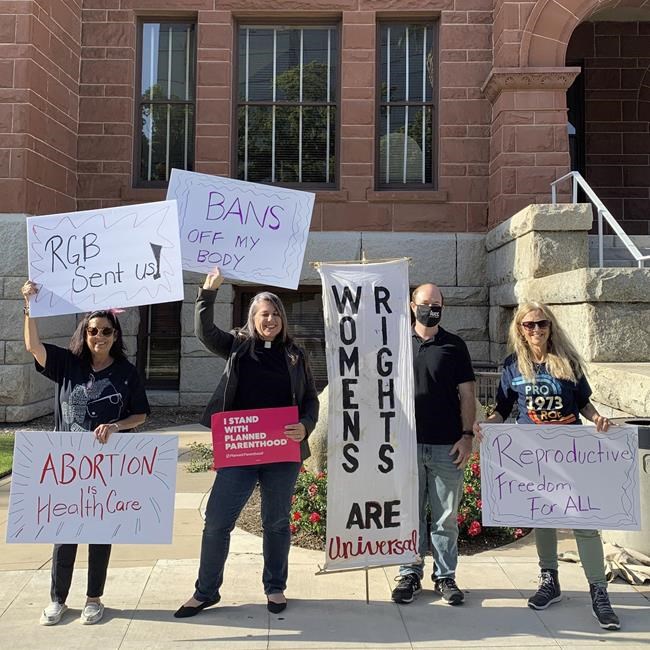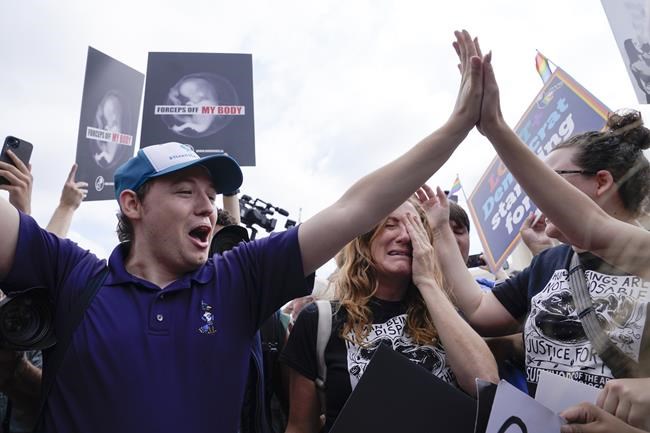From joy to anger, faith leaders react to Roe’s reversal
Advertisement
Read this article for free:
or
Already have an account? Log in here »
To continue reading, please subscribe:
Monthly Digital Subscription
$19 $0 for the first 4 weeks*
- Enjoy unlimited reading on winnipegfreepress.com
- Read the E-Edition, our digital replica newspaper
- Access News Break, our award-winning app
- Play interactive puzzles
*No charge for four weeks then billed as $19 plus GST every four weeks. Offer only available to new and qualified returning subscribers. Cancel any time.
Read unlimited articles for free today:
or
Already have an account? Log in here »
Hey there, time traveller!
This article was published 23/06/2022 (916 days ago), so information in it may no longer be current.
Religious Americans are deeply divided in their views on abortion, and reactions from faith leaders ranged from elation to anger after the U.S. Supreme Court overturned Roe v. Wade, the landmark 1973 decision that made abortion legal nationwide.
The ruling issued Friday was hailed by leading Catholic bishops, even though a majority of U.S. Catholics support abortion rights.
“I recognize there are people on both sides of the question in the Catholic Church,” said Baltimore Archbishop William Lori, who chairs the U.S. Conference of Catholic Bishops’ Committee on Pro-Life Activities. “What we are finding though is that when people become more aware of what the church is doing to assist women in difficult pregnancies … hearts and minds begin to change.”

The ruling also was welcomed by many evangelical Christian leaders, including Bart Barber, newly elected president of the the Southern Baptist Convention, the nation’s largest Protestant denomination. Southern Baptists “rejoice at the ruling,” he said.
However, the decision — expected to lead to sweeping abortion bans in more than 20 states — was decried by some mainline Protestant leaders, including Michael Curry, presiding bishop of the Episcopal Church. “I am deeply grieved,” he said.
Several Jewish organizations said the decision infringes on Jewish traditions that accept the need for abortion.
Nadiah Mohajir, co-founder of Heart Women and Girls, a Chicago nonprofit that works with Muslim communities on reproductive rights, expressed dismay: “More than half of American Muslims support safe access to abortion. What we’re seeing here is a very small minority of privileged people who are trying to impose a narrow Christian understanding of when life begins.“
Here are some more reactions from faith leaders:
“The release of the Dobbs decision marks a true turning point in the pro-life movement, a moment that Christians, advocates and many others have worked toward tirelessly for 50 years. … As this chapter comes to a close, we must understand this is not the end of our important work. The issue of abortion has now been turned over to the states, many of which have either implemented or are considering some of the most abhorrently permissive pro-abortion proposals ever.” — Brent Leatherwood, acting president of the SBC’s Ethics & Religious Liberty Commission, in a statement.
“Today’s Supreme Court decision … discarding nearly 50 years of precedent, will endanger the lives and well-being of birthing people who do not choose to continue pregnancy. God loves and cares for people who have abortions, and so does the United Church of Christ.” — General ministers of the United Church of Christ, in a joint statement.
“Abortion bans place greater value on the life of the fetus than on the pregnant person, a violation of both Jewish law and tradition and of American religious liberty. Now, it seems only certain people are entitled to religious liberty, which renders the entire concept meaningless.” — Sheila Katz, CEO of the National Council of Jewish Women, in a statement.
“This is a historic day in the life of our country, one that stirs our thoughts, emotions and prayers. For nearly fifty years, America has enforced an unjust law that has permitted some to decide whether others can live or die; this policy has resulted in the deaths of tens of millions of preborn children. … We mourn their loss, and we entrust their souls to God.” — Los Angeles Archbishop José Gomez, president of the U.S. Conference of Catholic Bishops, and Baltimore Archbishop William Lori, in a joint statement.

“Catholics on the right spent decades reducing church teaching to a single issue and linked arms with a conservative movement that is hostile to the church’s teachings about a consistent ethic of life and the common good. This ruling is the culmination of that misguided campaign.” — John Gehring, Catholic program director at the Washington-based clergy network Faith in Public Life, via Twitter.
“This Supreme Court abolished the constitutional right to abortion in an opinion that is a direct attack on the separation of church and state. Religious freedom demands the right to an abortion so people can make their own reproductive decisions according to their own principles. … Americans United is readying religious freedom litigation which will bring this argument to our courts.” — Rachel Laser, president and CEO of Americans United for Separation of Church and State, a group representing secular Americans, in a statement.
“This historic Supreme Court decision would not have happened without fifty years of patient, loving, hard work by people of all faiths and none in diverse fields including social service, religion, law, medicine, culture, education, policy and politics. But our work has just begun.” — Salvatore Cordileone, Catholic archbishop of San Francisco, in a statement.
“Today’s ruling is further evidence that the regressive political agenda of the far-right has reached the highest court in the land. Bodily autonomy and self-determination are deeply rooted humanist values that are critical for realizing an inclusive, pluralistic, and flourishing society. The right to abortion access has long been a culture-war issue utilized by radical evangelical and White Christian Nationalist movements to control women and undermine the well-being of our society.” — Nadya Dutchin, executive director of the American Humanist Association, in a statement.
“I support the right to life. … But it’s not my choice. When mostly white legislators pass laws that affect Black bodies, it’s criminalizing the plight of the poor. Once a child is born, there are disparities in health care, education, housing and employment. We could care less about a child outside the womb. It’s a sad day in America.” — The Rev. Clinton Stancil, lead pastor of Wayman African Methodist Episcopal Church in St. Louis, in an interview.
“Half the states will now become abortion free and millions of innocent lives will be spared from the barbaric practice of abortion. This is a human rights victory beyond all others and justifies the decades of tireless work by selfless pro-life individuals and organizations.” — Troy Newman, president of the anti-abortion group Operation Rescue, in a statement.
“I am deeply grieved. … I have been ordained more than 40 years, and I have served as a pastor in poor communities; I have witnessed firsthand the negative impact this decision will have. … Today’s decision institutionalizes inequality because women with access to resources will be able to exercise their moral judgment in ways that women without the same resources will not.” — Michael Curry, presiding bishop of the Episcopal Church, in a statement.
“More than ever, those who value all human life must demonstrate their commitment not merely with their words, but also by their deeds. We must urge legislators to protect the unborn, and we must provide compassionate support for women that will help them choose life.” — Adam Greenway, president of Southwestern Baptist Theological Seminary, in a statement.
“This court has no legitimacy. We will not live by this decision.” — The Rev. Jacqui Lewis, senior minister at Middle Collegiate Church in New York City, via Twitter.

___
AP religion team journalists Holly Meyer, Luis Andres Henao, Peter Smith and Deepa Bharath contributed to this report.
___
For AP’s full coverage of the Supreme Court ruling on abortion, go to https://apnews.com/hub/abortion.
___
Associated Press religion coverage receives support through the AP’s collaboration with The Conversation US, with funding from Lilly Endowment Inc. The AP is solely responsible for this content.
The Free Press acknowledges the financial support it receives from members of the city’s faith community, which makes our coverage of religion possible.


